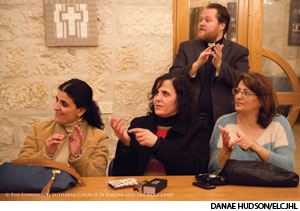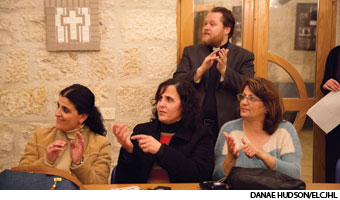For the first time in years, Johnny Bannoura is excited about going to church.
Participating in worship is difficult for Bannoura and his four siblings, all deaf since birth. Trained to read lips, he can have trouble following worship leaders who chant in Greek or Latin, speak quickly or stand far away.
Now every Friday night in Bethlehem, Bannoura attends a deaf ministry of the Evangelical Lutheran Church in Jordan and the Holy Land (ELCJHL). (A second group meets Mondays in Ramallah.)
During the service he might help lead the prayers, or sign or sing along with a hymn. And there’s always a Bible story that is acted out, told and signed by Fursan Ayed Zu’mot, a vicar and ministry leader. Zu’mot, Bannoura and other worshipers discuss the story’s message and how they can live accordingly.

Worshipers attend a deaf ministry service of the Evangelical Lutheran Church in Jordan and the Holy Land.
“Communication is 90 percent nonverbal,” Zu’mot said. “Watching body language, deaf people can understand a movie. So I use my whole body to tell a Bible story.”
The ministry began when ELCJHL Bishop Munib Younan noticed that churches in Palestine were ignoring the deaf. “Our church believes in holistic ministry and that we must serve all of God’s children,” he said. “Though they may be few, it is so important not to ignore this segment of society.”
Younan, who is also president of the Lutheran World Federation, learned that a deaf pastor had been ordained in Finland. So he approached the Finnish Evangelical Lutheran Mission in Jerusalem, which then recruited that pastor, Janne Rissanen, to start the ELCJHL ministry in 2011.
Personal visits
To find deaf Christians in largely Muslim cities, Rissanen visited deaf clubs around the West Bank and the Ephphetha School for the Deaf in Bethlehem. The first participants accepted his invitation, in part, because “I share the same life experience with them and I am able to take care of the soul of their starting points,” he said.
Today about 30 deaf people from diverse backgrounds — Orthodox, Latin Catholic, Maronite Catholic and Lutheran — share an eagerness to know more about Christ.
“I want to learn the Bible and I want to learn about Jesus,” Bannoura said. “Around the world, deaf people receive the proper treatment for Christian education, but here we do not have this. Now it is getting better.”
Mariana Mrabie, a Lutheran college student who attends the Ramallah ministry with her brother Majdi, said, “I understand everything that’s taught, all the stories about Jesus.” She’s grateful that “all of the deaf can gather together and worship God together.”
For older Christians, deaf school stopped at sixth grade. (Today deaf schools offer kindergarten through twelfth-grade.) Lip reading and speaking were stressed over sign language. Those who were taught sign language learned different versions. Rissanen said some in Palestine learned Palestinian sign language, while those schooled in Israel were taught Israeli Sign Language and those in Jordan were taught Jordanian Sign Language, which remains influential in Palestine today.
Isolated from hearing church members who can’t communicate with them and left out of Christian education, most deaf Christians have a sparse biblical foundation and may not know the “whys” behind sacraments like communion.
“The whole point of this ministry is to guide people to learn the Bible,” Zu’mot said. “They are not less than us. Because they are deaf, they should not be lost.”
The ELCJHL deaf ministry, Zu’mot said, is “like giving them life again while they are not part of that life.”
A welcome outreach
Along with weekly worship, Rissanen and Zu’mot help deaf confirmands with their studies, organize day trips, and raise funds for educational materials and occasionally hearing aids to help students like Mrabie with their studies. Home visits are a special priority.
The congregation grows by word of mouth as new members are located, visited and invited to worship. “People feel there is someone who cares about them, who wants to gather them again under one roof to worship God,” Zu’mot said.
To fully gather the community, Rissanen and Zu’mot hope to teach hearing church members to sign.
“Sign language is one of the most important languages to know because it is the language of God,” Zu’mot said. “God uses signs to talk to us.”
As outreach continues, Bannoura and others thrive in the new ministry. “I am still not fully knowledgeable about everything in the Bible. But over time, I am learning,” he said. “We are all improving our knowledge, thanks be to God.”
Global deaf connections
ELCA Global Mission staff and leaders of the Evangelical Lutheran Deaf Association (www.eldadeaf.org) met in Chicago Oct. 24 to explore ways to connect and partner with deaf ministries worldwide, said association President Linda Fairbanks.
Association members already are active supporters of the deaf ministry of the Lutheran Church of Christ in Nigeria. They also have participated in mission trips to Mexico, New Orleans, Haiti, Vietnam and Jamaica.
“Amazing connections happen when new partnerships are fostered,” said Sunitha Mortha, director for mission formation, ELCA Global Mission.





